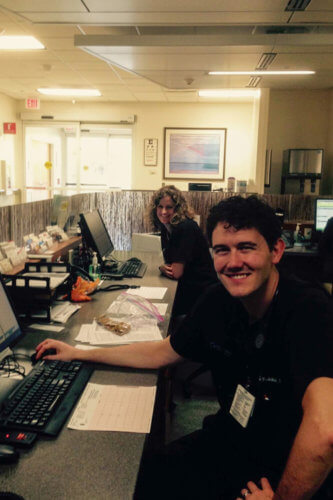
Evan Pushchak, MD, graduated from Colorado Academy in 2002. He received his BA in Philosophy from CU Boulder and his medical degree from the University of Colorado Medical School on the Anschutz Medical Campus, completing his residency in emergency medicine at Northwestern University Hospital in Chicago.
Dr. Pushchak kindly granted CA a phone interview during this busy time.
CA: First, Evan, are you and your family okay?
Evan: Shelby and I are fine, and my family is doing well. Shelby and I both work as physicians for Wake Emergency Physicians, a group of around 150 emergency room doctors, physician assistants, and nurse practitioners in Raleigh, N.C. We serve both freestanding emergency rooms and hospital emergency departments. We take care of every patient who arrives, independent of their ability to pay.
We typically work 8- to 9-hour shifts, 7 or 8 days in a row, and then have 6 or 7 days off. This can increase if necessary. We do not currently have anyone from our group who has been quarantined from COVID-19 exposure or illness.
CA: As you treat patients there, what are you seeing in the emergency room?
Evan: Currently, our ER volumes are down, as people are heeding the advice of local officials to stay home. Our emergency rooms are using PPE (personal protective equipment) when seeing all patients who are suspected of having a respiratory infection.
For invasive procedures, we wear powered air purifying respirators. We are doing selective testing, which goes to LabCorps or to the state lab. We also refer to drive-thru testing stations. My group also utilizes a telemedicine platform to decrease emergency room utilization. We anticipate that our local spike from COVID-19 patients will begin within the next 1-3 weeks.
CA: So much of what we are hearing is referencing past catastrophic events like Hurricane Katrina, 9/11, and others. Are there experiences or training that are guiding your work each day?
Evan: I was working as a third-year medical student at CU during the H1N1 outbreak. I don’t really remember much at all about that pandemic. What we are experiencing locally and seeing internationally with the COVID-19 pandemic is wholly unprecedented in modern medicine. In our current situation, with few treatment options for the virus itself, we try to use the best available clinical practices. Data on the coronavirus is changing daily, and we could experience supply shortages, especially ventilators and personal protective equipment.
As we see in Italy, when there are large influxes of critically ill patients, there is a mismatch of demand to available resources. ICUs there are overwhelmed and having to make tough decisions. What we want to avoid at all costs would be a collapse of our health care systems. I remember attending ethics seminars in medical school, discussing distributive justice and limited resource allocation, but it would be incredibly challenging personally being in such a situation, taking care of individuals while resources are so strained. I hope we can control this before it gets to that point.
CA: Is there advice you would have for the CA community on any front?
Evan: I would ask that people not underestimate the misery that is caused when this virus overwhelms the finite resources of healthcare systems. Check out the Atlantic article “The Extraordinary Decisions Facing Italian Doctors”, published on 3/11. This piece describes situations that I hope, with every ounce of my being, do not happen to us in the USA.
Please be civically responsible with social distancing, staying home, and slowing this thing down. Be mindful of how your purchasing of food and other goods impacts your broader community. 2020 will likely be one of the worst years for charitable giving, so if you find yourself in a financial position to donate, please support your favorite causes generously.
CA: Can you look down the road six months, nine months, or even a year and predict how we will look back on this pandemic? What will the next few months bring?
Evan: I can’t predict what the next few months will bring except to say about 10 percent of those who get COVID-19 will be very sick. How bad the situation gets will entirely depend on how we respond to it on a societal level. Widespread immunity will not happen in the near future, so it is critical to avoid infection by staying home and socially distancing yourself and your family.
It is only through collective effort that this virus will slow, and if everyone feels like they’re the exception to the rule, going on vacation, not following social distancing, etc., COVID-19 will devastate our country more than it already has.
CA: Is there anything we haven’t covered?
Evan: People are scared, and I would be happy to be made available as a resource. Please feel free to reach out at any time.